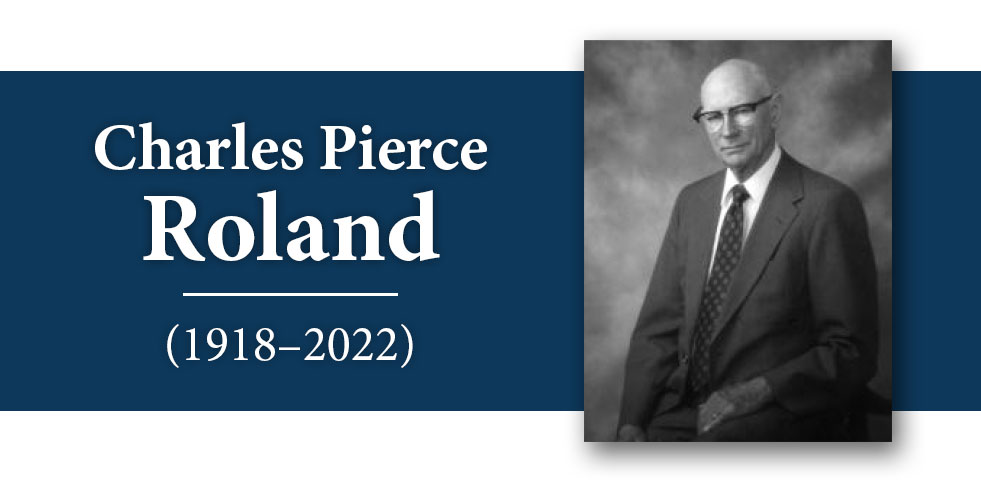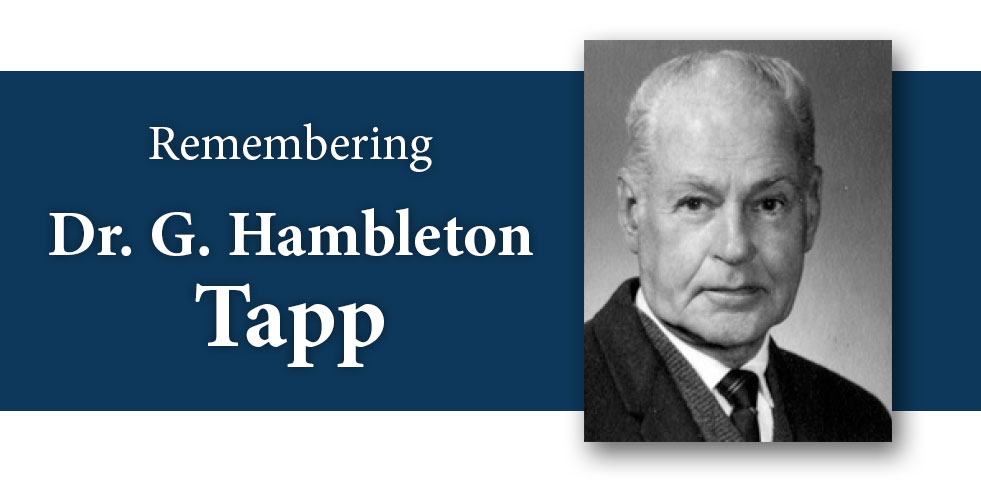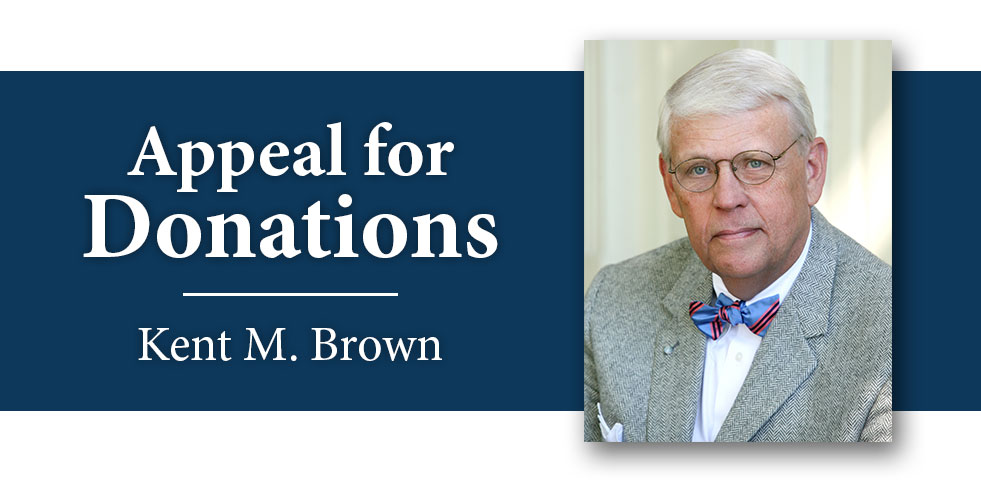Eulogy to Charles Pierce Roland
To me he was Charlie. We were close friends for more than forty years. What brought us together was a mutual love for American History, and Civil War History in particular.
Charlie was born in the Western Tennessee town of Maury City on April 8, 1918; he lived for 104 years. Charlie grew up in Henderson, Tennessee, the son, and grandson, of educators. Henderson’s close proximity to the Shiloh Battlefield played an enormous role in Charlie’s life. His family frequently drove to the Shiloh Battlefield for gatherings and celebrations.
Charlie and I often drove there to give tours together. We always stayed in the quaint southern town of Corinth, Mississippi, about twenty or so miles south of the battlefield. One day as we were driving around Corinth, I stopped at Battery Robinette, an earthwork made famous in the 1862 Battle of Corinth. Pointing to a wooden pavilion near the earthwork, Charlie said, “Do you know what I did as a kid in that pavilion?” I could only guess. “That,” he proudly replied, “is where my girl cousins taught me to dance the Charleston.”
Shiloh always had a grip on Charlie, and he wrote about it once:
“Shiloh was hallowed ground to me in my childhood. Born and bred in West Tennessee, only an hour’s drive from the famed Civil War battlefield, I visited there often. I went there on family occasions, on school excursions, to religious revival meetings. Shiloh’s historic sites—the Hornet’s Nest, the Sunken Road, the Peach Orchard, the Bloody Pond—were forever branded into my memory. So were Shiloh’s historic figures – Johnston and Beauregard, Grant and Sherman. I listened to the saga of valor at Shiloh; I looked upon the spot where Albert Sidney Johnston fell at the head of the Confederate Army; I pondered the effect of his death upon the outcome of the battle. His presence seemed to abide at Shiloh.”
Although the author of nine highly-acclaimed books, Charlie’s most renowned book is Albert Sidney Johnston: Soldier of Three Republics, published in 1964, the biography of the Kentucky-born commander of Confederate forces at the Battle of Shiloh who was mortally wounded there. As a young history professor at Tulane University, Charlie found Johnston’s papers in the archival collections and felt compelled to write Johnston’s biography because of his youthful association with Shiloh and years of contemplating Johnston’s untimely and tragic death.
Although Charlie’s thoughts often embraced Shiloh, his interests expanded to writing and speaking about the history of the American South. His love of the South began in graduate school under the incomparable Bell Irvin Wiley at Louisiana State University. There he studied with a young man who became his closest friend over his lifetime, Otis Singletary. It was Singletary who, as president of the University of Kentucky, brought Charlie from Tulane to Lexington.
Charlie became a giant in the field of Civil War history as a professor at the University of Kentucky. While there, he published A History of the South (1972); The Improbable Era: The South Since World War II (1975); An American Iliad: The Story of the Civil War, in (1991); Reflections on Lee: A Historian’s Assessment, (1995); Louisiana Sugar Plantations During the Civil War (1997); Jefferson Davis’s Greatest General: Albert Sidney Johnston, (2000); and History Teaches Us to Hope: Reflections on the Civil War and Southern History, (2010).
Charlie’s classroom teaching extended to multiple visiting professorships at the United States Military Academy at West Point and the Army War College at Carlisle Barracks, Pennsylvania. He brought Civil War history to those outside of academe, notably, as president of the Kentucky Civil War Roundtable from 1984 to 1994.
But what made Charlie’s lectures and books about the Civil War so authentic was that Charlie had been a combat-tested soldier in World War II, before he ever put pen to paper. Captain Charles P. Roland’s 394th Regiment of the 99th Infantry Division saw heavy combat in the battles along Elsenborn Ridge, they were struck by the German Sixth Panzer Division in what became known as the Battle of the Bulge. From the “Bulge” to the Remagen Bridge, Charlie was awarded the Bronze Star for extraordinary service, as well as the Purple Heart for wounds suffered at the Remagen Bridge. Charlie clearly had what we lawyers would refer to as “standing” to lecture and write about military history.
No reflection on Charlie’s extraordinary life would be complete without some words about the love of his life, Allie Lee Aycock, who passed away on April 26, 2018. Charlie met her after he had returned from the Army and was a graduate student at Louisiana State University; she was a graduate of Northwestern State College in Natchitoches, was working as a clinical dietitian at the Veterans Hospital in Alexandria, Louisiana.
When they were introduced in Alexandria, Charlie claimed that his “heart flipped.” He told Allie Lee that it was a pity that they could not have met earlier because he and his friends often partied in the Nakadosh Hotel in the town where she went to college. Reflecting upon the general reputation of those who frequented that hotel, her response was: “Oh no. I wouldn’t have given you the time of day.” Charlie claimed that he “knew in an instant that I wanted her to be mine,” yet if you asked his mother, according to Charlie, she believed that “he wanted to marry every girl he went out with.” But this time, though it was real, and it took only six dates for Charlie to ask Allie Lee to marry him. “Allie and Chick” were married in the Methodist church chapel in Alexandria on January 23, 1948. They would have three wonderful children, Karen, Cliff, and Charles. You could never be around Charlie without noticing how much he adored Allie Lee and how much he cherished his children, grandchildren, and great-grandchildren. I also got to know how they all cherished him. Allie Lee and Charlie were married for seventy years! As Charlie once wrote: “My home life has been rich.”
My faith teaches me that “Allie and Chick” are together again.
Finally, I recall when Charlie and I were to give Civil War lectures on the steamboat Mississippi Queen from on a two-week excursion down the Mississippi and Ohio rivers from Louisville to New Orleans. I called an old friend, Wah Wah Jones, who owned the Bluegrass Tour Company, and asked him if he could provide a limousine to get me, Charlie, and our wives to the wharf at Louisville. The limousine picked up me, my wife, Genevieve, and our 9-month old daughter, Annie, at our home, and then we drove over to pick up Charlie and Allie Lee.
The Limousine was a sight to behold; there were tubed lights all across the ceiling and around the windows in colors of blue, red, green, and gold. The lighting in the tubes seemed to move like it was water. There was even a myriad of star lights reflected on the ceiling, spinning around like a galaxy in space. Charlie and Allie Lee got in the car and were stunned at what they saw. Charlie, in particular, studied the lighting. He then exclaimed, “This is like a travelling bordello.” There was a moment of profound silence as everyone tried to figure out how to respond to Charlie’s comment. Then Allie Lee spoke up. “Charlie, what do you know about bordellos?” For the first time ever, at least in my presence, Charlie was speechless. Within seconds, though, everyone in the limousine, including the driver and Allie Lee, burst into laughter. Such was Charlie.
Charlie was an extraordinary man in so many ways, and he had a rich sense of humor that endeared him to all who knew him. I know I speak for everyone who knew him when I say that we all were blessed to have known Charlie and Allie Lee,
and will miss them more than we could ever put into words. ■



